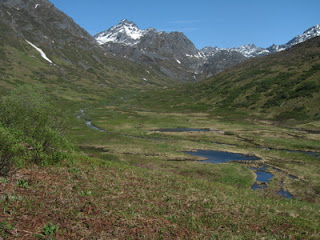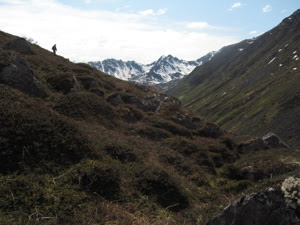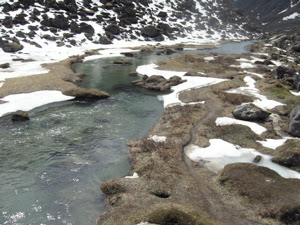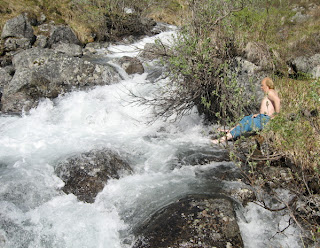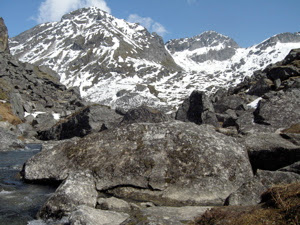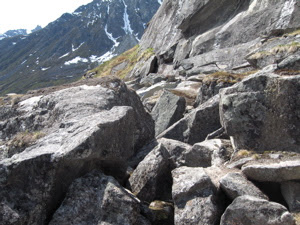It's 1943. An older Arab walks through his Algerian village calling for the young men to come out and join the French cause to defeat the Nazis. It ends in 2005 at the war cemetery in Alsace. Crosses across the hill. Then Muslim graves in another section. And an old man, one of the those young African recruits, visits several graves, then returns to his modest room in town. Screen words scroll the story of soldiers from newly independent colonies losing their pensions in

the 1960s, regaining them briefly, then seeing a new government reduce them once more. (Photo from
IMDb.)
In between, we see these Arab men become soldiers, fight for France, initially in North Africa where they produce the first French victory over the Germans since 1940. We see them shipped to France where they are briefly treated by the liberated population of Marseilles, not as 'wogs' but as men, and through all the slights, small and large ("The tomatoes are not for you;" home leave for the white French soldiers, but not the Africans, etc.), through stirring calls to arms for liberty, freedom, and equality, through acts of great bravery, and cold deaths.
We can learn a lot from history. I can't help but see this movie as a primer of how the West has contributed to the Muslim world's distrust of us. This movie shows us that the African soldiers who fought for the French were men like the Europeans they fought with, men who believed in liberty, freedom, and equality. Men who came to see that those words in the mouths of most French, did not apply to them.
The West has conquered the rest of the world, first by force, then through commerce, first in the name of Christianity and then in the name of Democracy. The conquered weren't the ignorant, uncultured savages that Western myth created. Sure, many were poor and uneducated, but they had rich cultural traditions, which we, in our ignorance couldn't see, or if we did, we dismissed. The colonized peoples of the world wanted freedom from Western rule, just as the American colonists wanted to escape the English yoke. Ho Chi Minh was turned down by the West after President Wilson's post-WWI fight for freedom for colonized peoples was lost. It was after American rejection that he got Russian help to get the French out of Vietnam. We too take unsavory partners like Mushareff of Pakistan to get the Taliban out of Afganistan. Those colonized peoples of the world who believed the noble ideals of the colonists, were embittered by the hypocrisy of those who spoke them. This is not to say there aren't ruthless dictators in formerly colonized nations; that there aren't radical Muslims who stir up hatred through extreme interpretations of the Koran. But Western behavior in non-Western nations for the last few centuries has also left a conflicting legacy, including many people very receptive to the radicals. This is not a simple, black and white story. That's my point. As I get to understand things more deeply, they often get more and more ambiguous. (Though some become clearer and clearer too.)
I know those out there whose reaction to that paragraph (of course, that assumes anyone out there has even gotten this far - honk if you have) will echo one of the Republican talking points: How dare you say that we had any responsibility for the attacks of 9/11? Blaming the victim ("women wouldn't get raped if they didn't wear such provocative clothing," etc.) is only an acceptable argument when the speaker is not the victim. But I'm not blaming the victim. I'm not saying the West is responsible for the attacks. It is all far more complicated than that. I am trying to expand the possible ways we can think about why 9/11 happened beyond 1) we are good and they are evil; or 2) we are good and they are crazy; or 3) we are rich and they are jealous.
In the 1960s the South was forced by the rest of the United States to accept, at least legally, that black folks had the same rights, under the law, as white folk. This didn't comply with their learned segregationist narratives that whites were superior to blacks, that blacks in the south knew their places, and they liked how things were. They didn't see how the hypocrisy rankled 'their' blacks.' And 'their' black men, coming home after serving in WWII, no longer were willing to settle for second class citizenship at home. (The movie traced a similar situation with France's African colonial people's situation in the French army.) And I would hasten to add that there were white Southerners who saw and hated the inequities of the South.
Today, many Americans feel the same way about their privileged lives and their special moral place in the world, as white Southerner's felt about their privileged lives and special moral superiority over blacks. Giving up segregation, meant giving up status (the most educated black in the South had to sit in the back of the bus, while the least educated white could sit in the front), it meant giving up white access (over blacks) to higher paying jobs , it meant giving up cheaper labor for white businessmen, all because blacks would no longer be forced to walk behind the whites.
And Americans have lived a life of privilege compared to much of the world. We have come to believe we are a special nation destined to lead the world. Yet our rhetoric of freedom and democracy hasn't always been matched by our deeds. We've backed ruthless dictators when it met our economic interests. We've treated non-white peoples with less respect than white peoples. (In all the immigration debate, I hear a lot more rancor against illegal Mexicans than I do about illegal Canadians.) We can say that our leaders have done this in our name, but in a democracy, we are all responsible for what our leaders do.
Saying that our actions caused people around the world to dislike us, is not the same as saying we are to blame for the attacks of 9/11. Nor does it absolve the attackers of their responsibility. But if we understand how the rest of the world thinks about us (and there is no unified "rest of the world" that has a single view of the United States) it will help us find ways to create a safer, more stable world, to find a way of exiting Iraq that will result in the least loss of life. Refusing to acknowledge that we as a nation do things wrong in the world, is no different from the many white Southerners who believed that their world was fine just the way it was, thank you very much.
Now that I've had my say, I'd strongly recommend the movie. Along the same lines, I also suggest you rent "The Battle of Algiers" another movie in French and Arabic about the Algerian independence movement. This is a movie that change my whole understanding of world politics and one I was glad to see was assigned to many American policy makers after 9/11. I guess George didn't see it.
 I hate going shopping to find something I need. I can never find it. So if I find something I like and I know I can use, when I'm not really looking, I buy it. Doesn't happen often. So in Seattle a couple of months ago, I found this pair of shoes. I bought em. They were comfortable and looked cool.
I hate going shopping to find something I need. I can never find it. So if I find something I like and I know I can use, when I'm not really looking, I buy it. Doesn't happen often. So in Seattle a couple of months ago, I found this pair of shoes. I bought em. They were comfortable and looked cool.







